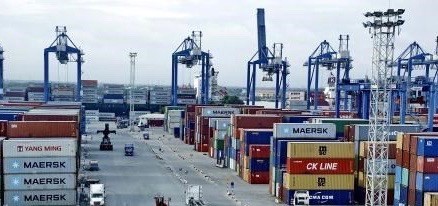 Illustrative image (Photo: VNA)
Illustrative image (Photo: VNA)
The Saigon Newport Corporation is a pioneer of digital transformation in the logistics sector. In 2021, despite the difficulties caused by the Covid-19 pandemic, the Tan Cang Cai Mep International Port set records in terms of the volume handled by mother ships from 14,235 TEU to 15,615 TEU, and the handling capacity of 238.08 containers per hour by the ship One Columba continued to exceed the throughput of 2 million TEUs. It also handled over 55 percent of the market share of export and import container volume through seaports nationwide.
Gemadept also overcame a challenging year with double-digit throughput growth in all three regions. Its total throughput last year is estimated at 2.7 million TEUs, equivalent to impressive growth of 53 percent. That success is thanks to the corporation’s digitalization of port operation and logistical processes, thus helping optimize time and resources and save costs for customers.
Other logistics enterprises such as DHL, FedEx, Maersk Logistics, APL Logistics, CJ Logistics and KMTC Logistics are also entering the race for digital transformation, which has key for businesses to overcome difficulties, compete with each other and develop further.
However, at present, only around 40 percent of enterprises in this sector are conducting digital transformation.
 Modern machinery used in logistics industry (Photo: vneconomy)
Modern machinery used in logistics industry (Photo: vneconomy)
Addressing a recent policy dialogue on the logistics sector held by the Vietnam Trade Promotion Agency (Vietrade) and the Korea Trade-Investment Promotion Agency (KOTRA) in Hanoi, Vietrade Director Vu Ba Phu said that economic growth, especially imports and exports, is posing challenges to Vietnam’s logistics industry.
With the Fourth Industrial Revolution, traditional logistics centers have been switched to new-generation centers using high technologies, he said, adding that an action plan to enhance the competitiveness and development of the Vietnamese logistics sector until 2025 has been implemented to cut costs and improve efficiency in the sector.
Dinh Huu Thanh, CEO of the Bee Logistics Corporation, asked the Government to consider logistics a supporting industry and as such issue more appropriate policies, while continuing to modernize its management in this field.
























